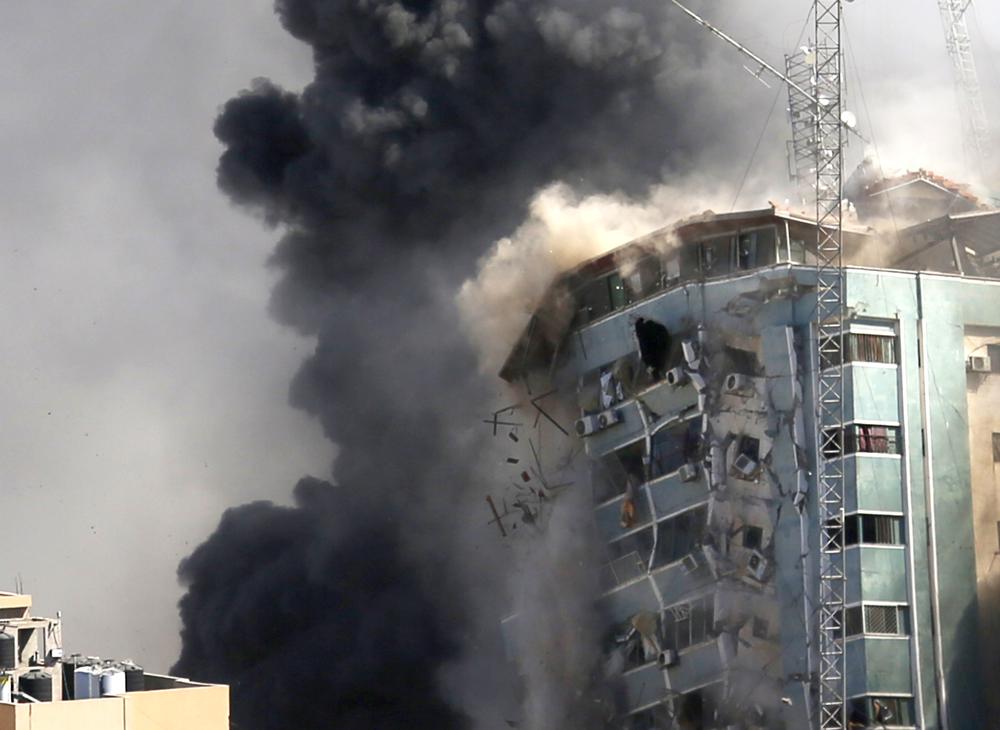A ceasefire holds after Israel’s 11-day assault on Gaza that killed over 240 Palestinians, including 66 children, and injured more than 1,700 people. Hamas rockets fired on Israel killed at least 12 people. Despite the ceasefire, colonial violence continues, as Israeli security forces backed Jewish settlers in storming the Al-Aqsa Mosque compound Friday and authorities continue evicting Palestinians. Israeli police announced their intent to arrest hundreds of Palestinian citizens of Israel for their participation in recent sit-ins in support of Palestinians in occupied East Jerusalem and the Gaza Strip.
Mainstream news outlets have at times covered these events with appropriate nuance and direct language, though they may use misleading words such as “clash,” “skirmish,” or simply “violence” to describe police attacks and airstrikes. Oftentimes though, corporate media is unwilling to engage more deeply with the conflict, and defaults to upholding the status quo.
Holly Jackson, a junior at Massachusetts Institute of Technology, conducted a recent study analyzing more than 33,000 New York Times articles on Palestine and Israel using machine learning methods. The research, currently in preprint submitted to the Journal of Palestine Studies, shows a history of bias against Palestine in the New York Times, consisting of more negative and violent language in reference to Palestinians and a disproportionate use of the passive voice to describe violence against Palestinians.
…(1) use of more negative & violent rhetoric in reference to Palestinians, & (2) a disproportionate use of the passive voice to refer to violent action perpetrated towards Palestinians. My code is posted free and open-source on Github https://t.co/DlItbIoOGw 6/12
— Holly Jackson (@h_jackson_) May 20, 2021
This bias affirms the flaws of journalistic objectivity, as a major news outlet that touts “both sides” reporting has shown shown a consistent slant against Palestine. As a FAIR analysis demonstrates, examples in the past weeks abound of mainstream news outlets “presenting a false equivalency between occupier and occupied” and minimizing information that shows the scope of Israel’s brutality. Corporate media have framed Israel’s bombings as a defensive response to Palestinian aggression. But,
“Hamas’ rocket fire was a follow through on its promise to fire rockets in “response” to and “retaliation” against Israel if the latter didn’t remove its forces from the Jerusalem neighborhood of Sheik Jarrah, where Israel has been attempting to force Palestinians from their homes and repressing the resultant protests, and from the Al-Aqsa Mosque compound, which Israel had just raided during Ramadan, Islam’s holiest month.”
Moreover, FAIR’s Gregory Shupak argues, as an occupying power, Israel has no legal right to claim self-defense against the people it occupies. Mainstream reporting creates the false impression that the violence is perpetuated equally by “both sides,” but in this attempt at journalistic balance, it obscures that only Israel has ethnically cleansed, prevented Palestinians from returning to their homes, and enforced apartheid and military occupation.
For some organizations, calling attention to this false balance is a friable offense. Emily Wilder, a twenty-two-year-old journalist who had worked at the Associated Press for three weeks, was fired after making this observation on Twitter: “Using ‘Israel’ but never ‘Palestine,’ or ‘war’ but not ‘siege and occupation’ are political choices—yet media make those exact choices all the time without being flagged as biased.”
“objectivity” feels fickle when the basic terms we use to report news implicitly stake a claim. using “israel” but never “palestine,” or “war” but not “siege and occupation” are political choices—yet media make those exact choices all the time without being flagged as biased
— emily wilder (@vv1lder) May 16, 2021
A snowballing group of conservative politicians and media outlets criticized the statement, using her words to fuel the right-wing argument that the AP is biased against Israel. Days before Wilder tweeted those words and was fired, Israel bombed a Gaza building housing offices of the AP and Al Jazeera, in another instance of escalating violence against non-state-controlled press.
In Canada, a group of journalists grew frustrated with Canadian media coverage that reported on Israel’s airstrikes without context or Palestinian voices. More than 2,000 people signed the open letter they drafted to Canadian newsrooms. Shortly after it was published, letter organizers heard from journalists who had been called to meet with management at their newsrooms to discuss why they signed. At least three people were taken off coverage of the region. According to ex-correspondent Paul Adams, CBC was one such organization that reprimanded employees and, in some cases, barred them from covering the Middle East.
Do not take the power you have in the workplace to isolate and in effect bully young journalists who are precarious in their careers, some casual employees. Step up and meet the arguments.
— Paul Adams (@padams29) May 21, 2021
Columbia Journalism Review’s Jon Allsop wrote of objectivity that critics see tradition as one of its central sins: “privileged perspectives and practices have ossified, over time, into core tenets of journalism, such that deviating from them can be perceived as deviating from journalism itself.” Journalists demanding nuance are breaking from mainstream values, and in so doing, endangering their careers.
Reporting from mainstream news outlets may benefit from reconsidering how “objectivity” colors the conflict between Israel and Palestine. The New York Times has recently published several opinion pieces featuring Palestinian voices, and the Associated Press is slated to review its social media policy after 150 staff members spoke out against Emily Wilder’s firing. Pressure from progressives such as Alexandria Ocasio-Cortez and Bernie Sanders too may force more critical coverage, especially as the U.S. continues selling billions in arms to Israel. All news organizations must examine if the reality of their “both sides” coverage perpetuates bias against one.
Photo by Hatem Moussa/AP Photo

